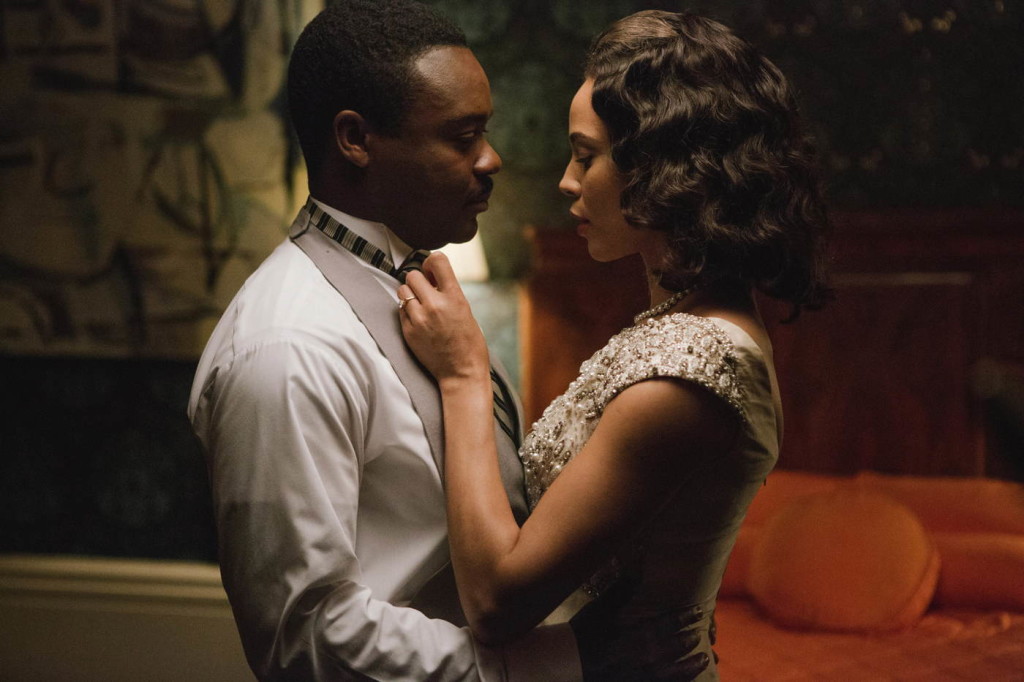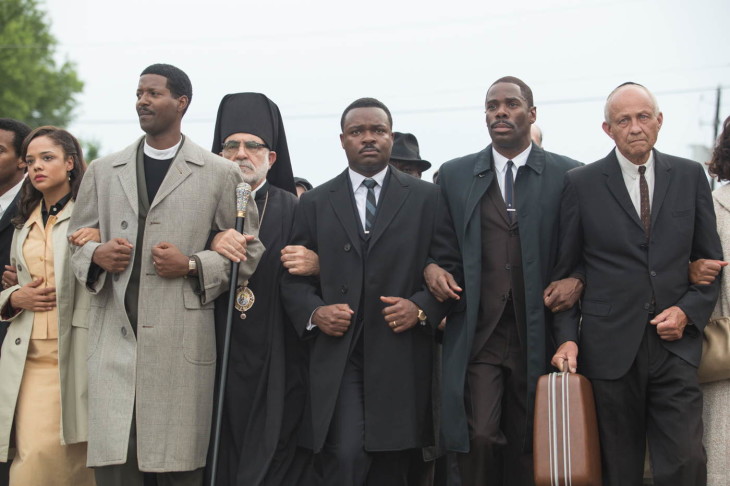Friends of Pinney Library will present 87th Academy Awards’ “Best Picture” nominee, Selma (2014), at Madison Public Library – Pinney Branch at 6:30p this evening. Admission is FREE. The docudrama co-written and directed by Ava DuVernay has enjoyed an inordinately lengthy run in every commercial Madison theatre and a renaissance at Market Square since its release here in early January. The confidence of vision is not difficult to fathom with regard to the obstacles to render the film from page to screen, but Selma has additionally benefited from interest in the 50th anniversary of Dr. Martin Luther King, Jr.’s march from Selma to Montgomery, Alabama, and relevance in widespread voter ID legislation as well as the social justice rallies in this city in the wake of Tony Robinson’s tragic death and national police violence that has predominantly targeted unarmed black men.
However, DuVernay’s film initially avoids confrontation and instead leads with surprising understatement in its timeless message of tolerance and nonviolent activism with a scene in the Kings’ private hotel room. As the courageous orator (David Oyelowo) rehearses his acceptance speech for the Nobel Peace Prize in December 1964, the moment encapsulates the film’s equal concern for the interpersonal moments of self-doubt as the rousing publicity of the Civil Rights Movement in the 1960s. DuVernay and co-writer Paul Webb wisely choose to focus upon various behind-closed-door discussions involving the Baptist King and wife Coretta (Carmen Ejogo) as well as fellow Southern Christian Leadership Conference (SCLC) leaders like Andrew Young (Andre Holland), James Bevel (Common), and John Lewis (Stephan James).
The veracity of these scenes is equated less with encyclopedic consensus than the director’s methodology, which is actually invigorating to the docudrama where the approach to the genre tends to favor diluted overview. Additionally, none of MLK’s actual speeches are included in the Paramount Pictures-distributed film, because licenses from King’s estate were bound to an unmade DreamWorks Pictures and Warner Bros. project with Spielberg attached as producer (a far cry and perhaps even antithetical to DuVernay’s tempered triumph). Considering this historical omission, the potency of the spoken word coupled with Oyelowo’s charisma is remarkable. After listening to hours upon hours of MLK’s motivating monologues, DuVernay spiritually translated his cadences, vocabulary, and penchant for reiterating a single point from three different angles to Oyelowo’s dignified and yet vulnerable air.
The first act’s course is charted in King’s insistent meeting with President Lyndon Baines Johnson (Tom Wilkinson) through the proposal of a Voting Rights Act that would dismantle the systematic oppression and intimidation of the black population during voter registration. One of its introductory scenes provides a microcosmic glimpse into the racism persistent in Alabama at its time with Annie Lee Cooper (an almost inconspicuously quiet Oprah Winfrey)’s rejection at a courthouse by a bigoted white registrar. The right to vote, as Dr. King articulately explains to LBJ, is directly tied to the incarceration of black men and women, because registered voters are only allowed to serve on the juries. In what has attracted criticism, the uncooperative LBJ turns MLK’s crusade into unnecessarily convoluted political theatre, which likely contains several inaccuracies to the assiduous historian. Even disregarding the debate of its verisimilitude and the President’s ultimate heroic speech before Congress, his prolonged scenes of leaden plot-structuring play against the generally compelling developments in King’s inner circle.

While Selma succeeds in capturing an intimacy unseen in a cinematic context between black American leaders, the film occasionally threatens to collapse under the accumulating weight of supporting roles. Malcolm X (Nigel Thatch)’s encounter with Coretta feels like an obligatory part of something larger removed before the final screenplay draft. Confidential talks between LBJ and adviser Lee White (Giovanni Ribisi), J. Edgar Hoover (Dylan Baker), and Alabama Governor George Wallace (Tim Roth), are diminished in resonance through the scenes’ literal abridging. Yet, David Oyelowo’s humane performance alone is enough to clear a path through all these truncated clips that cut from point A-B-C in the blink of an eye.
Perhaps it is DuVernay’s wish to convey a restlessness in the way King’s heart is pulled and coerced by fellow civil rights activists, ordinary citizens, family, and law enforcement/local officials. Its pacing and editing signify Selma‘s clear intention to come over as comprehensive history lesson while simultaneously revering the tale of human drama. In demonstration of this proposed balancing act, the privacy of the film’s opening scenes are later countered with a stock montage of footage and photographs of people on the Selma-to-Montgomery march across the Edmund Pettus Bridge. The activists’ journeys, from King to the young John Lewis of the Student Nonviolent Coordinating Committee (SNCC), revert to b/w from color in this oscillating narrative focus through time. But what remains in the wake of their plight, both dramatized and actual, is an indisputably necessary chronicle of a courageous movement.
That Civil Rights Movement faced its most violent opposition from Alabama state troopers during what came to be known as “Bloody Sunday,” the unsuccessful march on March 7, 1965. Despite the overused slow-motion stylization during intense physical and/or emotional clashes, Bradford Young’s framing during the march and its subsequently successful reattempt at once finds a resilient, sweeping, and artistically minded community portrait as well as a personal one of King. Considering these two pilgrimages as the most memorable sequences, Selma is unafraid to allude to the United States’ current climate, particularly in John Legend and Common’s Oscar-winning anthem, “Glory,” that lyrically builds a bridge from Selma to Ferguson, Missouri.
It’s a testament to social progress that the prevailing white attitudes in the film’s representation of the American South seem more distant than a mere fifty years. While that is a promising prospect, the obstinacy of racist rhetoric in pocked rural areas mentioned in the film still unsettles (and invites satire) whenever it surfaces in today’s news. It’s a most legitimately demoralizing image- one that seems to have crept into this decade’s voter ID proposals throughout the country. Rousing films like Selma ask us, regardless of race or background, to arise for justice and not sit idly by awaiting an idealistic recovery through the voices and actions of others.
- Selma screens FREE at Madison Public Library – Pinney Branch (204 Cottage Grove Rd) on June 5 at 6:30p as part of their “First Friday Flicks” series. FREE popcorn and beverages will be provided.

